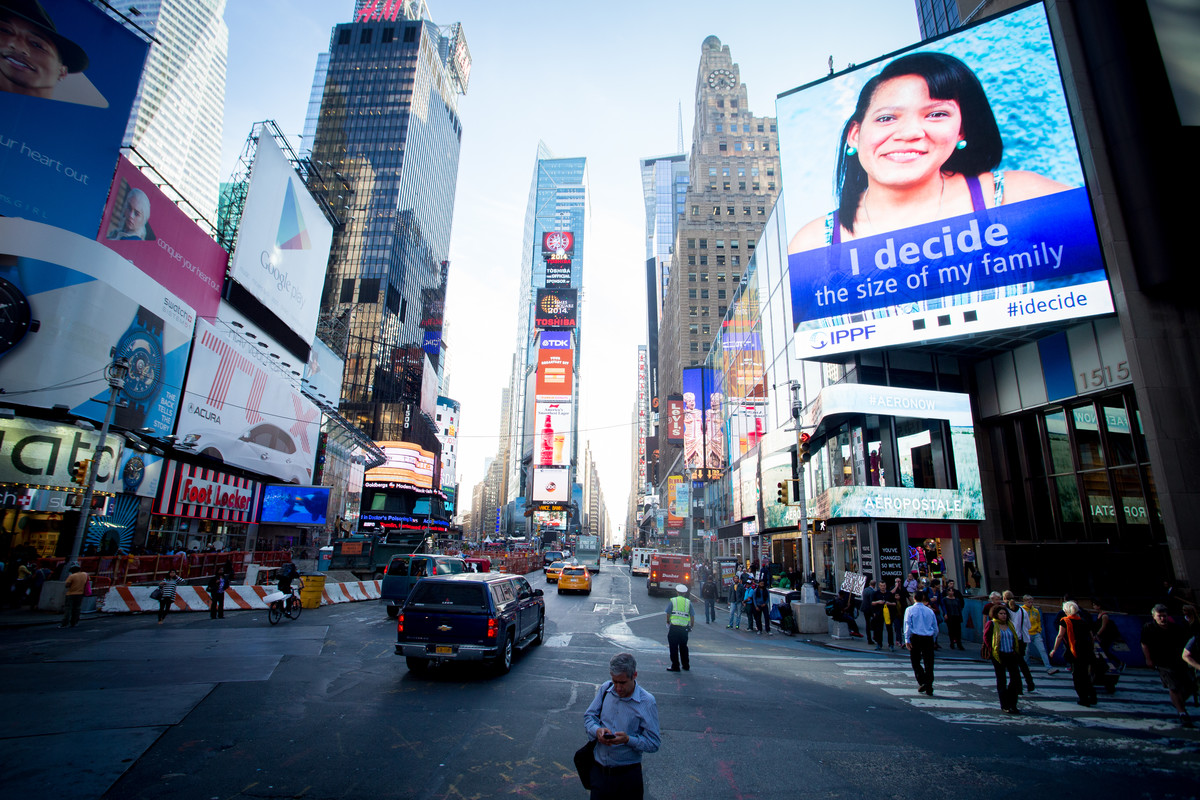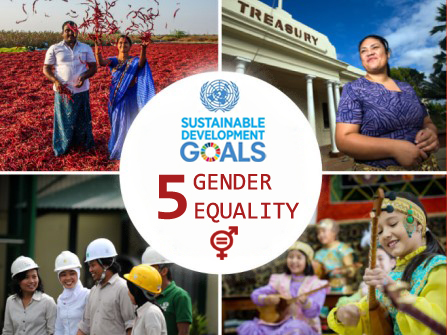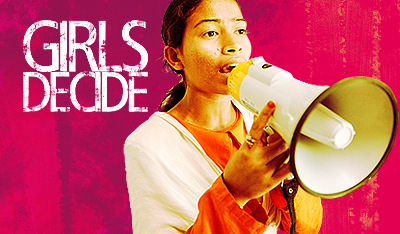
Gender equality is a human right. It is also essential for eradicating poverty and improving the lives of future generations. Gender equality is at the heart of all our programming and advocacy work. IPPF pushes for legal and policy reforms which combat female genital mutilation (FGM), early forced marriage and other forms of gender discrimination.
Articles about Gender equality

A bright future: Lanterns for women's empowerment
Women's empowerment is key to ensuring gender equality and health equity. A partnership between public, private and civil society found a unique way to address health and gender inequalities in some of the most disadvantaged communities of northern Ghana. This short film funded by the Japan Trust Fund showcases a project that introduced solar lanterns, health and economic interventions to 20 villages.

Thousands sign up to support sexual health
A 410,000–strong petition has been handed to the United Nations calling for women and girls to be put at the heart of the world’s next poverty reduction targets. The I Decide petition, which was started by the International Planned Parenthood Federation, aimed to ensure that sexual and reproductive health and rights were a central focus of the Sustainable Development Goals being decided this month (SDGs). People from 151 countries around the world signed the petition which has been handed to the United Nations Secretary General, Ban Ki-Moon. In a letter to Mr Ban, the Director-General of IPPF Tewodros Melesse, said: “IPPF has gathered the hopes of women, men and young people -gathered from around the world – who have called for the ability to decide on their own futures, including what happens to their bodies, who they share their life with and the size of their families. “They expressed their support for sexual and reproductive health and rights to be at the heart of the new development framework and we are grateful for your support in ensuring this is the case,” he added.

IPPF joins forces to call for gender equality
The International Planned Parenthood Federation (IPPF) has joined forces with Keira Knightley, Annie Lennox and a string of other celebrities and humanitarian organisations to call on the new International Development Secretary to lead the global fight for gender equality. About 40 individuals and charities have written to Priti Patel urging her to show strong leadership, adding that progress towards achieving women’s rights is too slow and under-funded. . The letter says it’s now time ‘to tackle the unacceptable discrimination and injustices women and girls continue to face on a daily basis’. Today @marthalanefox, @lovegwendoline + 38 more ask @patel4witham to invest in #fearless grassroots women’s groups: https://t.co/yDMWmL4YDd — ActionAid UK (@ActionAidUK) 12 August 2016 The issues facing women and girls, it says, range from the gender pay gap to online abuse, sexual violence in conflict, and girls’ lack of access to education - gender inequality continues to be a major barrier and affects women and girls everywhere. Statistics show that one in three women will face violence in their lifetime, nearly two thirds of the world’s illiterate adults are women, and that fewer than four per cent of the world’s leading corporations have female CEOs. We stand with other #womensrights supporters in this letter to @patel4witham https://t.co/7h2RNNl793 #fearless pic.twitter.com/UHlXyih0Qm — Womankind Worldwide (@woman_kind) 12 August 2016 Despite the problems facing women and girls it is an area that misses out on investment. An independent report found recently that funding women's rights organisations is a "neglected" area in Dfid (the Department for International Development) spending. The letter says: “While there is no quick fix for achieving gender equality, we know that challenging social norms and prioritising women’s voice and leadership are vital. There is also broad consensus that one of the linchpins of realising long-term, transformative change for women and girls is a strong, vibrant and sustainable women’s rights movement, which remains chronically under-funded.” The letter calls for Ms Patel to invest further in grassroots organisations that support women around the world. It says: “Across the world, women’s rights organisations are at the forefront of providing services to survivors of gender-based violence; ensuring women and girls’ participation at every level; holding their national governments to account for their policies and practices. Without them it will not be possible to keep the promises of the SDGs (Sustainable Development Goals).” In July Ms Patel publicly committed to keeping the Government's promises to the world’s poor, which was included in the 2015 poverty reduction targets (the SDGs). The signatories of the letter include ActionAid UK, Annie Lennox, Anoushka Shankar,Barbara Broccoli, Care International UK, Caroline Criado-Perez, Christian Aid, Emma Thompson, Felicity Jones, FORWARD, Gwendoline Christie, Imelda Staunton, International Rescue Committee (IRC), Jane Wellesley, Jodie Whittaker, Keira Knightley, Laura Marling, Leith Clark, Livia Firth, Martha Lane Fox, Maryam D’Abo, Naomie Harris, National Alliance of Women’s Organisations (NAWO), Oxfam GB, Paloma Faith, Plan International UK, Progressio, Sarah Waters, Shami Chakrabarti, Stars Foundation, Sophie Walker, Thandie Newton, The Circle, Vanessa Redgrave, WEN Wales, White Ribbon Alliance, Widows for Peace through Democracy (WPD), Womankind Worldwide and Women’s Equality Party. A story about the letter was published in the Daily Telegraph which can be read here: www.telegraph.co.uk/news/2016/08/12/keira-knightley-and-vanessa-redgrave-call-on-priti-patel-to-lead/
Ex-IPPFWHR Regional Director wins UN Award
Carmen Barosso, previous Regional Director for IPFPWHR, has been recognised for her dedication to increase sexual and reproductive health care and to empower women to demand their rights. Winning the United Nations Population Award, Camen said that sexual and reproductive health is intextricable from human rights. “Putting sexual and reproductive health and rights at the heart of population and development policies” was a turning point, Ms. Barroso said in her acceptance speech. It helped to “unleash a cultural sea change, a new language, and new ways of thinking.”

Girls Decide
This programme addresses critical challenges faced by young women around sexual health and sexuality. It has produced a range of advocacy, education and informational materials to support research, awareness-raising, advocacy and service delivery. Girls Decide is about the sexual and reproductive health and rights of girls and young women. Around the world, girls aged 10 to 19 account for 23% of all disease associated with pregnancy and childbirth. An estimated 2.5 million have unsafe abortions every year. Worldwide, young women account for 60% of the 5.5 million young people living with HIV and/or AIDS. Girls Decide has produced a range of advocacy, education and informational materials to support work to improve sexual health and rights for girls and young women. These include a series of films on sexual and reproductive health decisions faced by 6 young women in 6 different countries. The films won the prestigious International Video and Communications Award (IVCA). When girls and young women have access to critical lifesaving services and information, and when they are able to make meaningful choices about their life path, they are empowered. Their quality of life improves, as does the well-being of their families and the communities in which they live. Their collective ability to achieve internationally agreed development goals is strengthened. Almost all IPPF Member Associations provide services to young people and 1 in every 3 clients is a young person below the age of 25. All young women and girls are rights-holders and are entitled to sexual and reproductive rights. As a matter of principle, the IPPF Secretariat and Member Associations stand by girls by respecting and fulfilling their right to high quality services; they stand up for girls by supporting them in making their own decisions related to sexuality and pregnancy; they stand for sexual and reproductive rights by addressing the challenges faced by young women and girls at local, national and international levels.
At a Glance 2015
Key facts and figures highlighting IPPF's achievements in 2015.
Locally owned
We want to enable all women and girls to decide about their body, the size of their family, their education and future. We provide services to meet their contraceptive needs, and bring about policy changes locally and globally, as their sexual and reproductive rights are human rights.
IPPF and Youth
The world has the largest youth generation ever. IPPF is putting young people at the heart of its services: with them, we want to change social norms and guarantee their rights.
Women, Girls and Gender
The data about gender inequality are shocking: millions of women are victims of early marriage, female genital mutilation and different sorts of gender violence and discrimination.
Service Delivery
Women and girls around the world have an unmet need for reproductive health services. In 2015, IPPF provided 175 million services, 82% of which went to poor and marginalised people.
Pagination
- Previous page
- Page 11
- Next page






